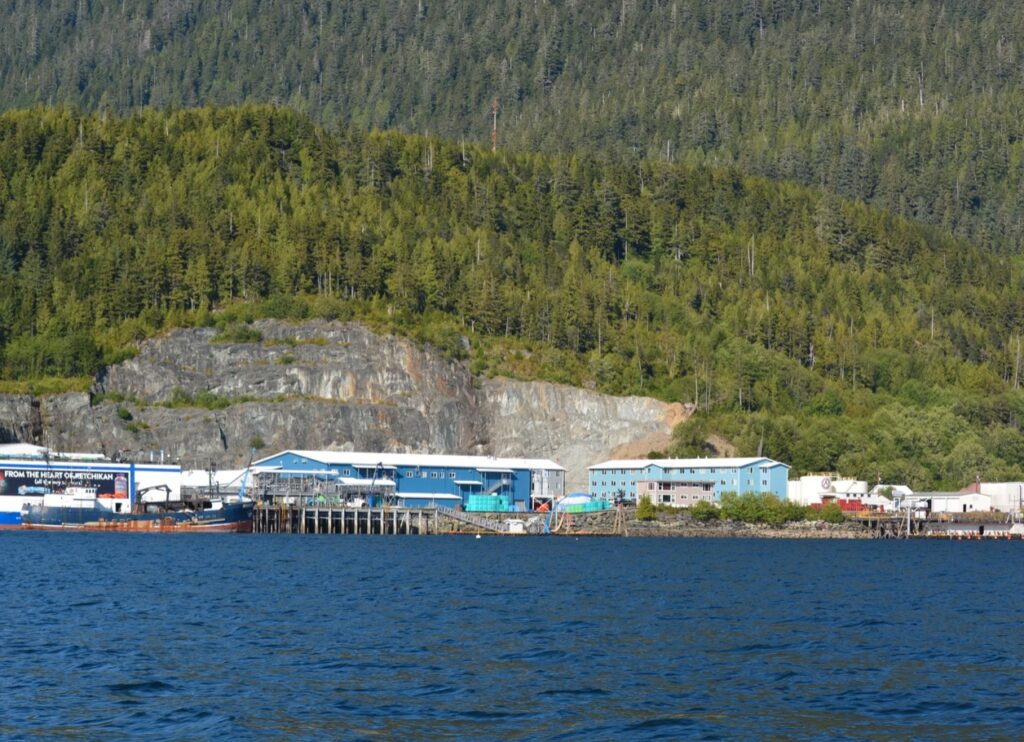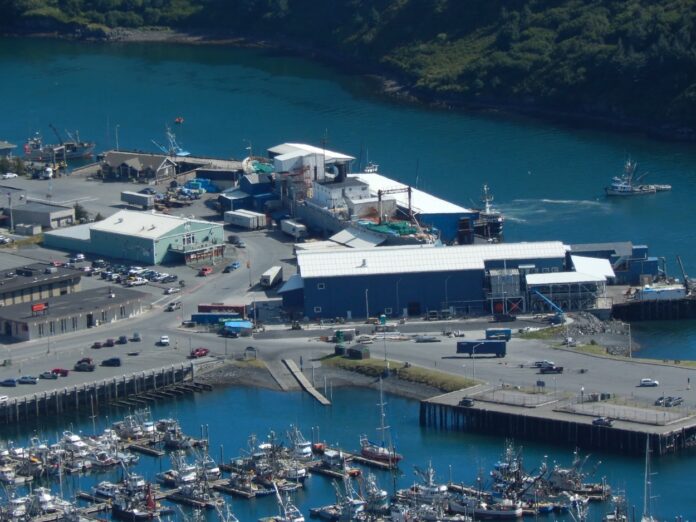In a sweeping company overhaul, Trident Seafoods is divesting four out of its 12 processing plants located in Alaska. This move will also result in employee layoffs across the company.
The four plants slated for sale are situated in Kodiak, Ketchikan, Petersburg, and False Pass.
Trident Seafoods’ CEO, Joe Bundrant, emphasized the need for decisive action, stating that the steps today to restructure are essential to ensure equitable returns for the fishing fleet, communities, and stakeholders.
While actively seeking potential buyers for the four plants, Trident Seafoods is planning to continue to operate its Kodiak facility on a considerably reduced scale during the upcoming winter season. This restructuring aims to secure the company’s future while adapting to evolving industry dynamics.

“Our Kodiak operations are integral to the Gulf of Alaska fisheries,” said Jeff Welbourn, Senior Vice President of Alaska Operations at Trident Seafoods. “They are highly efficient, multispecies plants, and we are working diligently to find a new owner to support the fleet and the Kodiak community.”
Trident also announced that its regional salmon strategy would refocus operations in Southeast Alaska and Area M.
As the company seeks buyers for its seasonal plants in Ketchikan, Petersburg, and False Pass, it said in a statement, “These are all well-maintained operations that align better with other operators’ strategies. We are optimistic the combination of new ownership and our continued service to the fleet through our other locations will mean little to no disruption for regional salmon fleets.”
To round out the Alaska operations strategy, Trident is retiring or seeking buyers for other assets, such as the historic South Naknek Diamond NN cannery facility and the support facilities in Chignik. The company is also assessing its overall company-owned vessel strategy.
The restructuring effort is not confined to Alaska alone. Trident is also streamlining its head office support functions, resulting in a 10% reduction in workers.
The restructuring effort enables Trident to execute its strategic drive to modernize its processing plants throughout Alaska. In August, the company announced a delay to the three-year plan to build a new, state-of-the-art processing plant in Unalaska’s Dutch Harbor to replace an aging plant in Akutan, Alaska. Construction is likely to resume once the restructuring activities are complete.
“We are modernizing and re-tooling the remaining Alaska plants to be more efficient, effective, and sustainable operations,” the company said. “This will allow us to continue supporting as many fleets and communities as possible across Alaska for the long term.”
The company is also looking at whether it should keep its fleet of fishing vessels.
Trident’s strategy reflects the realities facing U.S. seafood producers in global markets. Across many species, the combination of declining demand, excess supply, and foreign competition has driven prices down, squeezed margins, and displaced U.S. producers from markets that they developed over decades, the company said.
“We are competing against producers in other countries that do not share our commitment to or investments in environmental sustainability, social responsibility, and product quality,” said Bundrant. “Many of our foreign competitors operate with minimal regulatory costs and oversight, inexpensive infrastructure, and exploitive labor practices.”
Overall, I remain confident in the Alaska seafood industry and our role in it. These are significant changes, and we are focused on treating our impacted employees and communities with the respect and compassion they deserve,” said Bundrant. “Embracing these changes and operating a more streamlined company will allow us to reinvest in the communities, people, processes, and assets that enable us to continue our mission of responsibly sharing wild Alaska seafood with the world.”
Trident is a prominent player in the US seafood industry and has plants across Europe and Asia, including China. The list of the Alaska plants are at this company link.

This doesn’t sound good for Alaska’s economy nor its future when the private sector is bailing on us one business at a time.
Alaska can’t live off the federal government nor the taxes it collects from its working people forever. Eventually a big government state or nation runs out of money. Then its government employees and non profit employees be looking for a new employer who can pay their wages.
Lest we forget, we have a juicy Permanent Fund Account to tap into that will certainly allow today’s generation to live on Tier-1 benefits while future generations (ie: snot-nose and spoiled brats) can fend and figure it out for themselves.
This generation can go through that big, juicy Permanent Fund faster than slick through a goose. This isn’t Norway. We’re way, way more socialist and needy than that.
Hopefully you can admit our (“today’s”) generation living on tier-1 benefits is pretty snot-nosed and spoiled in their own right.
The commercial fishing industry has always been a gamble, for both fishermen and companies. Trident is restructuring to become more profitable. I quit fishing in 1985 to make a living for my family and a retirement from the electrical trade. It was a great decision.
Alaska Halibut in grocery stores in Fairbanks is over thirty and sometimes thirty five dollars a pound . I am not sure any of these resources that come out of water in and near Alaska are processed for us Alaskans ? If this fish got frequent flyer miles ,they’d probably be the most expensive fish in the world . I was in Dutch Harbor a few years ago and saw the thousands of refrigerated cones boxes headed to China for processing whole fish . Then it comes back to CostCo and WalMart for sale to us Alaskans as fresh fish . I am sure the Chinese will be purchasing the processing plants and moving the operation overseas .
They’ll sell to the Chinese.
Exactly! All one has to do is read their language and you will know what direction they are coming from. Trident Seafoods’ CEO, Joe Bundrant, emphasized the need for derisive action, stating that the steps today to restructure are essential to ensure equitable returns for the fishing fleet, communities, and stakeholders.
Build back better……..NOT
Well the greedy fishing industry has finally ruined the fishing stocks.
This shows the feds and state couldn’t manage a cool-aid stand.
The over fishing has caused the entire eco system to fail just like no crab in the Bering sea no kings in the kenai no salmon up the rivers.
All commercial fishing needs to be cut at least 75%.
This potentially will be devastating to Petersburg.
It’s hard to compete with Russian floating factories. Especially when the Russians aren’t affected by market forces.
Biden and his failing dollar did this. A dollar in 2020 is only worth 54 cents today… Joe must go…
Agree ?
When an outfit like Trident posts a plant for sale it could be chalked up to restructuring or consolidating within the company. On the other hand, when it posts four plants for sale it indicates a restructuring or consolidating of the entire market. Not good optics. They should have tried to quietly sell one plant after another over time. The market message this dramatic move sends is chilling all buyers. Not smart on their part.
Anyone remember Wakefield?
Let me guess who’s buying these plants, China? FJB!!!
Implication of your comment is that China is stupid enough to buy unprofitable profit centers?
The future of fishing in Alaska is lower volume, high quality and higher value. It’s the only way we can maintain sustainability and it appears Trident fully understands this.
But perhaps too late.
In a nutshell, Alaska has salmon, groundfish, and crab to catch, process, and sell.
Salmon has always been a huge gamble and made worse with new and cheaper means for raising salmon artificially.
The vast majority of crab comes from the Bering Sea and the fishery has all but flat-out disappeared due to a warming ocean.
That leaves groundfish, which is overwhelmingly pollock, and to a lesser extent cod and flatfish. Much of the groundfish is highly dependent on foreign reprocessing, and Trump-era tariffs killed those markets. Pollock profit margins are best met by the more efficient offshore floating catcher processor fleet; brick and mortar facilities like Tridents have always lagged. Trudent nevertheless tried to keep up by proposing a new efficient plant in Dutch Hrb. but when that proposition failed, they threw in the towel.
wimleitch – There is no direct evidence that climate change was the cause of the Bering Sea crab collapse. There is, however, much anecdotal evidence & testimony that points the finger at the Seattle based factory trawl fleet that is dragging football field sized nets through the crab nurseries. Even though they call themselves mid-water trawlers, in recent testimony before the North Pacific Fishery Management Council, they did admit that their nets were actually on the bottom as much as 80% of the time!
Those two theories aren’t mutually exlusive
Actually, they are absolutely mutually exclusive. Your rebuttal depends upon the fallacy that warming affects only crab but not other species.
All just part of the agenda of NOAA and the National Marine Fishery Service to consolidate the fisheries into the hands of corporate interests and make life difficult through regulation for the thousands of independent fishermen in the USA. Trident has its own fleet of factory trawlers that can supply all their processing needs once they can get the OK from State and Federal regulators to sell the tens of millions of pounds of bycatch from their directed fisheries. It has already started when the North Pacific Fishery Management Council allowed the factory trawl fleet to sell blackcod which totally collapsed the price for the independent Alaska blackcod fishermen. Pretty soon they will be selling halibut, crab and salmon bycatch. The handwriting is on the wall!
Well said. I hope braver men than me are willing to stand for their family’s legacy or even their liveliehood, rather than flee to state economies with more cushion after being given the great education this state once offered.
Comments are closed.